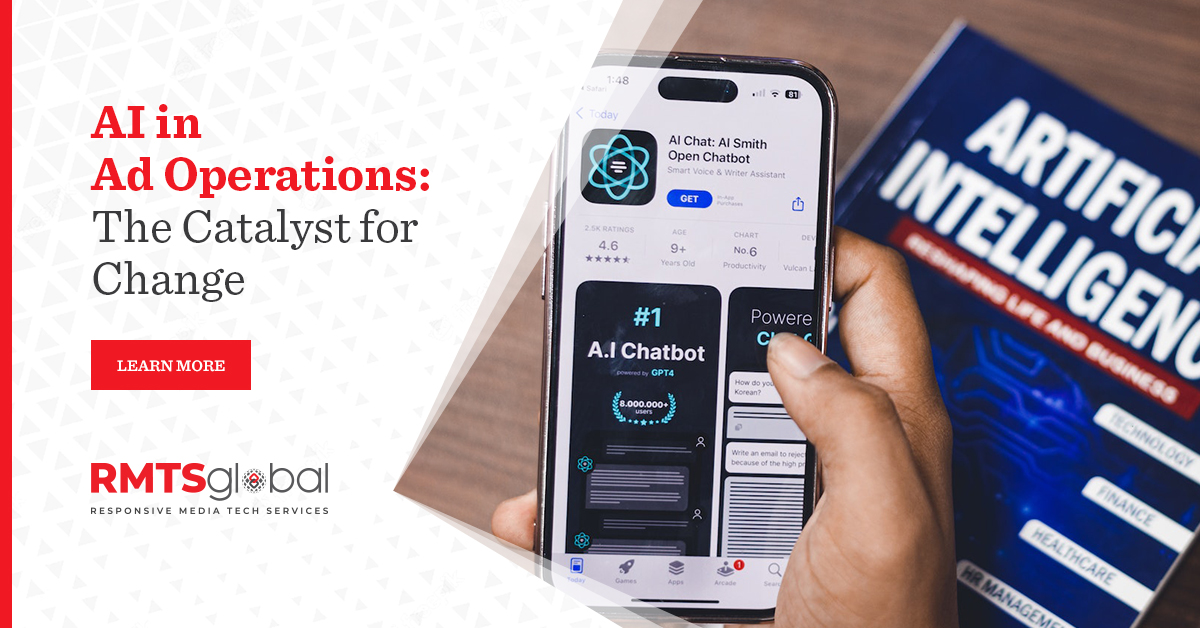Ad operations, often referred to as ad ops, is the beating heart of any successful advertising campaign. It’s the engine that ensures ads reach the right audience at the right time. And in this era of data-driven decision-making, Artificial Intelligence (AI) has emerged as a game-changer in ad ops, reshaping the industry’s future.
AI in Ad Operations
- Enter Artificial Intelligence. AI is not a mere buzzword; it’s a powerful tool capable of handling the complexity of ad ops with finesse. Here’s how AI is reshaping the landscape:
- Efficient Campaign Setup: AI algorithms can automate campaign setup across various platforms, saving hours of manual work. They analyze historical data, audience behavior, and campaign goals to make informed decisions on targeting, bidding, and creative assets.
- Optimization Beyond Human Capabilities: AI doesn’t just optimize; it excels at it. Machine learning algorithms can analyze vast datasets in real-time, adjusting bidding strategies, ad placements, and targeting parameters to achieve optimal performance. This level of precision is beyond human capabilities.
- Personalization at Scale: AI-driven personalization is the future of advertising. It analyzes user behavior and preferences to deliver hyper-targeted ads. Recent innovations have even brought us one-to-one personalization, where each user sees a unique ad tailored to their interests.
- Ad Creative Enhancement: AI-driven tools can optimize ad creatives in real-time. They can A/B test different creative elements, like headlines, images, and ad copy, to identify the most effective combinations.
- Predictive Analytics: AI doesn’t just react; it predicts. Predictive analytics powered by AI can forecast campaign outcomes, helping advertisers make data-driven decisions in advance.
Also Read: Mastering the Art of Google Ads – Top 5 Tips to Boost Your CTRs
Recent Innovations in AI Ad Ops:
- Conversational AI for Customer Engagement: Chatbots and virtual assistants have become integral to customer engagement. They offer personalized interactions, answer queries, and even guide users through the sales funnel.
- Voice Search Optimization: As voice search gains prominence, AI is used to optimize ad content for voice queries. Natural language processing (NLP) algorithms decipher user intent from voice searches, ensuring relevant ad placements.
- AI-Powered Ad Fraud Detection: Ad fraud remains a significant concern in the industry. AI algorithms analyze vast datasets to detect anomalies and patterns associated with fraudulent activities, enhancing ad security.
- Cross-Channel Advertising: AI seamlessly integrates advertising across various channels, from social media to search engines to email marketing. This ensures consistent messaging and maximizes reach.
- Dynamic Pricing Optimization: E-commerce advertisers use AI to dynamically adjust product prices based on demand, competition, and other market factors, optimizing revenue.
- Visual Search: AI-powered visual search allows users to search for products by uploading images. It’s a game-changer for e-commerce, as it connects users with products they may not have the words to describe.
Challenges and Considerations:
While AI brings immense benefits to ad ops, there are challenges to navigate:
- Data Privacy: As AI relies on data, ensuring compliance with data privacy regulations like GDPR and CCPA is paramount.
- Transparency: Advertisers must understand how AI-driven decisions are made. AI should not be a black box; it should provide actionable insights.
- Integration: Implementing AI seamlessly into existing ad operations can be complex and requires a well-thought-out strategy.
- Cost: While AI can be cost-effective in the long run, the initial investment can be substantial. Small businesses may need to weigh the costs against the benefits.
The Future of Ad Ops:
AI is not just a tool; it’s a transformational force in ad operations. Its ability to process vast amounts of data, make real-time decisions, and enhance personalization is reshaping the advertising landscape. As AI continues to evolve, we can expect even more innovative solutions that simplify ad operations, boost ROI, and create more meaningful connections between advertisers and their audiences.
In conclusion, AI is the catalyst for change in ad ops. Its efficiency, personalization capabilities, and predictive analytics are redefining how advertisers reach and engage their target audiences. As the advertising industry continues to evolve, embracing AI in ad ops will be the key to staying competitive and achieving marketing success in the digital age.
